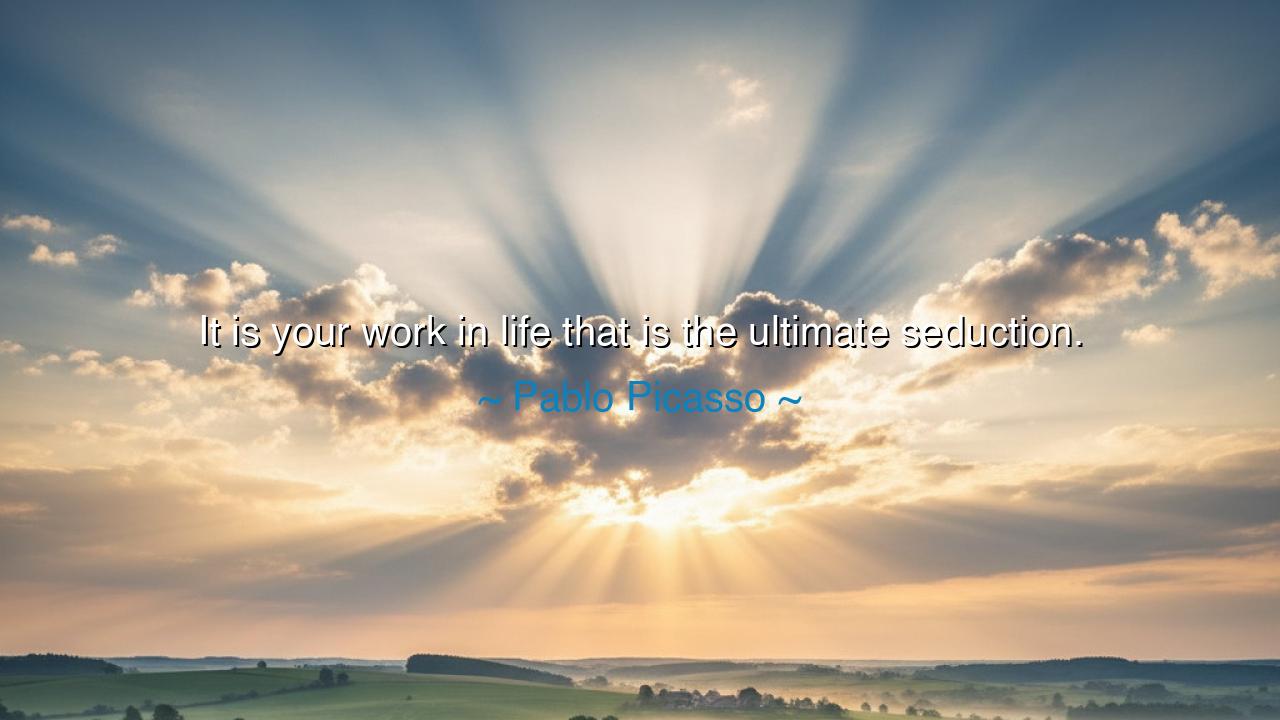
It is your work in life that is the ultimate seduction.






Listen, O seeker of purpose, to the words of Pablo Picasso, the master whose hand traced visions of the unseen: "It is your work in life that is the ultimate seduction." Herein lies a truth as old as the mountains, whispered by sages and artisans alike, that the labor of the soul, when pursued with passion and devotion, calls forth a magnetic force more powerful than charm, more enduring than beauty. The seduction Picasso speaks of is not of flesh or fleeting desire, but of the spirit stirred by dedication and creative fire.
In the loom of existence, the work of one’s life is the thread that binds vision to reality, dreams to form. To immerse oneself in this sacred toil is to awaken a power that draws admiration, respect, and even love—not by seeking them, but by letting the authenticity of effort shine forth. Picasso reminds us that true allure is born not from idle gestures, but from the relentless pursuit of mastery, from the hand and heart aligned with purpose.
Consider the ancients, who revered the craftsman, the poet, the philosopher, each absorbed in their labors of creation. Their lives were a testament to the magnetism of focus, the irresistible pull of one wholly devoted to their calling. Like the sculptor chiseling stone or the scribe illuminating manuscripts by candlelight, the power of work lies in its capacity to reveal the inner essence of the doer, and in this revelation, the world is drawn as moths to flame.
Yet heed this wisdom, for the seduction of work is subtle; it is earned, not claimed. It demands discipline, courage, and vision, a willingness to endure the nights of doubt and the storms of failure. In this labor, the self is refined, tempered, and illuminated, until the mere presence of such devotion inspires awe. To the world, it is not the artist or thinker merely who captivates, but the resonance of the effort incarnate, the living testament of one’s soul in motion.
So, O descendants of striving, let this teaching lodge within your hearts: the ultimate enchantment lies not in idle pursuits, nor in transient pleasures, but in the steadfast devotion to your work, the manifestation of your gifts upon the canvas of life. In this pursuit, one becomes both the creator and the irresistible, and in the echo of labor well wrought, the world cannot help but be drawn, compelled, and transformed.






Ccho
Picasso’s perspective on work being the ultimate seduction challenges how we typically view success. But is it possible that the 'seduction' here refers to the pursuit of mastery or the feeling of creating something meaningful? Could it be that our work, when done with passion and dedication, pulls us into a state of flow, where we feel truly alive?
[[N]•Cao
The idea of work as seduction is intriguing, but it also raises a question: is it healthy to find such deep attraction in work? What happens when work becomes the sole focus, and everything else falls into the background? Could this obsession with work lead to burnout or dissatisfaction in the long run?
TTThu Trieu
This quote made me reflect on the idea of purpose in life. Picasso seems to suggest that finding purpose through work is the ultimate form of attraction, but what about those who find fulfillment in other areas, like family or hobbies? Can their lives be as 'seductive,' or is work truly the highest form of engagement?
NLNgan Le
I understand what Picasso is saying, but I wonder: what if someone’s work isn't something they're passionate about? Can their work still seduce them, or is it something else that drives them? Does this idea of seduction apply to everyone equally, or is it something that only certain people with intense careers experience?
CDchuc_905 dang
This quote speaks to the allure of passion in our work. But isn't there a fine line between being 'seduced' by our work and becoming obsessed with it? How do we ensure that our love for our work doesn’t overshadow the other important parts of life, like relationships or personal well-being?